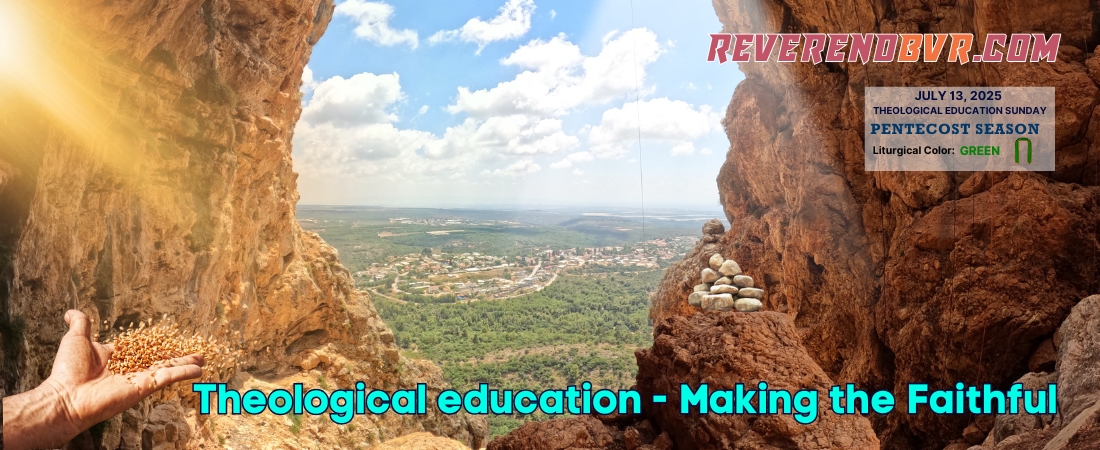Theological education is not merely about learning doctrine but about becoming faithful—formed by Scripture, shaped by virtue, and rooted in divine memory. As this sermon explores through Joshua, Paul, Jesus, and the Psalms, true theological formation involves heart, mind, and spirit being cultivated in the presence of God to bear lasting fruit for the Church and the world.
Sermon Title: Theological Education: Making of the Faithful.
Occasion: Theological Education Sunday | July 13, 2025, Sunday.
Scripture Readings: Scripture Readings: Joshua 4:1–9; 1 Timothy 6:11–16; Matthew 13:1–9; Psalm 1.
Website: www.reverendbvr.com
Introduction
Theological education (paideia theou, παιδεία θεοῦ) is not merely academic—it is formation in the presence of God (divine formation). It goes beyond mastering texts to embodying the logos (λόγος)—the Word made flesh (John 1:14). In a fragmented world, theological education molds coherent, faithful persons by rooting them in divine truth, moral character, and spiritual discernment.
In simpler words we can say, Theological education is about shaping persons in God’s image through the curriculum of Scripture, tradition, reason, and experience.It’s not just “learning about God,” but being formed by God through structured reflection and embodied discipleship.
1. Memorial Stones and Pedagogical Legacy (Joshua 4:1–9)
The passage in Joshua centers on the act of placing twelve stones as a lasting memorial. The key Hebrew term here is:
- זִכָּרוֹן (zikkārôn) – “memorial, remembrance.” – This word implies more than memory; it is covenantal. In Israel’s theology, remembrance is a spiritual discipline (cf. Exodus 12:14; Leviticus 23:24). These stones teach theological education through communal memory and ritual pedagogy.
The instruction to future generations (v.6–7) shows that theological education was embedded in Israel’s national life as a tool for covenant transmission across generations.
Historical-Theological Insight: Jewish tradition understands education (chinuch, חִנּוּךְ) not as neutral intellectual development, but as dedication—from the same root as Hanukkah, which means dedication of the Temple. Thus, theological education is about consecration, not just cognition.
2. Apostolic Charge and Moral Formation (1 Timothy 6:11–16)
Paul’s exhortation draws from rich Greek terminology that defines the moral and spiritual qualities of a theological life:
- δικαιοσύνη (dikaiosynē) – “righteousness”
- εὐσέβεια (eusebeia) – “godliness, reverence”
- πίστις (pistis) – “faith, faithfulness”
- ἀγάπη (agapē) – “divine love”
- ὑπομονή (hypomonē) – “endurance, steadfastness”
- πραΰτης (prautēs) – “gentleness, humility”
These virtues represent a moral curriculum—formation through the imitation of Christ, not mere intellectual ascent. The Greek term for “fight” in verse 12 is:
- ἀγωνίζου (agōnizou) – from which we get the English agony, meaning to struggle or contend. Theological education involves spiritual struggle, forming students to persevere in truth and grace.
In verse 13, Paul’s reference to Jesus’ testimony before Pontius Pilate recalls Jesus’ bold confession of kingship and truth (John 18:37), making theological education a confessional vocation.
3. Parable of the Sower and Pedagogy of the Heart (Matthew 13:1–9)
Jesus’ parable of the sower contains profound pedagogical implications. The Greek word for “parable” is:
- παραβολή (parabolē) – meaning “to place beside,” i.e., a comparison or analogy used to communicate deeper spiritual truths.
Parables require theological imagination to decode.
The different soils represent heart conditions. Notably:
- καρδία (kardia) – “heart” in Greek, not merely the emotional center but the seat of intellect, will, and spiritual understanding.
The “good soil” represents the spiritually prepared person who integrates theological teaching into life, bearing fruit—an image echoed in rabbinic writings where Torah learners are trees bearing fruit.
4. Delighting in Torah and Meditative Formation (Psalm 1)
Psalm 1 opens the Psalter with a contrast between the righteous and the wicked. Key Hebrew words deepen the theological framework:
- אַשְׁרֵי (’ashrē) – “Blessed, deeply fulfilled”
This word implies a deep-rooted, flourishing joy derived from covenant fidelity. - תּוֹרָה (Torah) – “instruction, law”
Often misunderstood narrowly as legal code, Torah is divine teaching—formative revelation. - הָגָה (hāgāh) – “meditate, mutter, ruminate”
This verb implies deep, vocal meditation, as practiced in Jewish tradition. To meditate day and night is to be saturated with divine wisdom, forming one’s identity through Scripture. - צָלַח (tsalach) – “prosper” (v.3), but in Hebrew thought, this means thrive or succeed according to God’s will—not necessarily worldly success.
Theological education today must recapture this biblical vision of wisdom: shaped not just by inquiry but by delight, not just by learning but by loving the Word.
Conclusion: Theological Education and the Challenge of the Age
When theological education is faithful to Scripture and the Spirit, it accomplishes the following:
- Preserves memory – zikkārôn as seen in Joshua
- Forms virtue – dikaiosynē, eusebeia, agapē as urged by Paul
- Prepares the heart – kardia in Jesus’ teaching
- Delights in truth – Torah and hāgāh in the Psalms
We live in an age of short attention spans and theological relativism. In such a time, the task of theological education is prophetic. It calls us back to a rooted, resilient, and revelatory faith. True theological learning always begins in the fear of the Lord and leads toward Christlikeness.
Summary Table
| S.No | Scripture | Key Original Term(s) | Meaning | Application |
| 1 | Joshua 4 | זִכָּרוֹן (zikkārôn) | Memorial, covenantal memory | Teaching through communal acts of remembrance |
| 2 | 1 Timothy 6 | δικαιοσύνη, εὐσέβεια, ἀγωνίζου | Righteousness, godliness, contend | Ethical formation and spiritual perseverance |
| 3 | Matthew 13 | παραβολή, καρδία | Parable, heart | Readiness to receive and bear theological fruit |
| 4 | Psalm 1 | תּוֹרָה, הָגָה, אַשְׁרֵי | Instruction, meditate, blessed | Rooting life in Scripture and divine wisdom |
Closing Prayer
O Eternal Teacher,
You who spoke through stone and scroll, Through prophets, parables, and apostles— Grant us hearts that hunger for Your truth. Plant in us the wisdom of Your Torah,
The righteousness of Your kingdom, The gentleness of Christ’s spirit, And the memory of Your mighty works.
May our studies be worship, Our scholarship a witness, And our lives a living theology.
In the name of the Word made flesh—Jesus Christ—Amen.
Bibliography
- Brown, Francis, Driver, S.R., Briggs, Charles A. A Hebrew and English Lexicon of the Old Testament. Clarendon Press, 1906.
- Louw, Johannes P., and Eugene A. Nida. Greek-English Lexicon of the New Testament Based on Semantic Domains. United Bible Societies, 1988.
- Bonhoeffer, Dietrich. Theological Education Underground (1937–1940). Fortress Press, 1990.
- McGrath, Alister. Christian Theology: An Introduction. Wiley-Blackwell, 2020.
- Wright, N.T. The New Testament and the People of God. SPCK, 1992.
- Bockmuehl, Markus. The Cambridge Companion to Jesus. Cambridge University Press, 2001.
Learn Words from the Original Scriptures (For deeper understanding and meditation on today’s theme)
| S.No | Language | Word | Transliteration | Meaning | References |
| 1 | Hebrew | זִכָּרוֹן | zikkārôn | Memorial, remembrance | Joshua 4:7, Exodus 12:14, Leviticus 23:24 |
| 2 | Hebrew | חִנּוּךְ | chinuch | Dedication, education | Deuteronomy 6:7, 2 Chronicles 17:7 |
| 3 | Hebrew | אַשְׁרֵי | ’ashrē | Blessed, deeply fulfilled | Psalm 1:1, Psalm 2:12 |
| 4 | Hebrew | תּוֹרָה | Torah | Instruction, law | Psalm 1:2, Deuteronomy 4:44 |
| 5 | Hebrew | הָגָה | hāgāh | Meditate, mutter, ruminate | Psalm 1:2, Joshua 1:8 |
| 6 | Hebrew | צָלַח | tsalach | Prosper, succeed (in God’s way) | Psalm 1:3, Joshua 1:7 |
| 7 | Greek | παideία | paideia | Training, discipline | Ephesians 6:4, Hebrews 12:11 |
| 8 | Greek | θεοῦ | theou | Of God | 1 Timothy 6:11, John 1:1 |
| 9 | Greek | λόγος | logos | Word, divine reason | John 1:1, Revelation 19:13 |
| 10 | Greek | δικαιοσύνη | dikaiosynē | Righteousness | Matthew 6:33, Romans 3:22 |
| 11 | Greek | εὐσέβεια | eusebeia | Godliness, piety | 1 Timothy 4:7, 2 Peter 1:3 |
| 12 | Greek | πίστις | pistis | Faith, trust | Hebrews 11:1, Romans 10:17 |
| 13 | Greek | ἀγάπη | agapē | Divine love | 1 Corinthians 13:4, 1 John 4:8 |
| 14 | Greek | ὑπομονή | hypomonē | Endurance, perseverance | Romans 5:3, James 1:12 |
| 15 | Greek | πραΰτης | prautēs | Gentleness, humility | Matthew 11:29, Galatians 5:23 |
| 16 | Greek | ἀγωνίζου | agōnizou | To struggle, contend | 1 Timothy 6:12, 2 Timothy 4:7 |
| 17 | Greek | παραβολή | parabolē | Parable, comparison | Matthew 13:3, Mark 4:2 |
| 18 | Greek | καρδία | kardia | Heart, inner being | Matthew 5:8, Romans 10:9 |
© 2025 ReverendBVR.com | High-Academic Sermon Series, 2025.
Content licensed under Creative Commons Attribution-NonCommercial-NoDerivatives 4.0 International (CC BY-NC-ND 4.0). You are free to share — copy and redistribute the material in any medium or format with proper attribution. No commercial use or modifications allowed without explicit permission.
For further sermons and biblical reflections, please visit 🌐 www.reverendbvr.com/sermons

